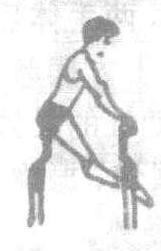内正坐
指用大腿后部坐于双杠任一杠的内侧,双手撑前杠的坐撑姿势。动作要领:两手正握、直臂撑前杠,用大腿后部坐于后杠,腿并拢伸直前下举,上体挺直,梗颈,眼视前下方。教学重点:坐的部位要准确,姿势优美。
内正坐Nei zhengzuo
指大腿后部坐于一杠内

内正坐
动作要领 手正握直臂体前撑杠,用大腿后部坐于后杠, 腿并拢伸直自然下垂。挺胸、立腰、梗头。
保护与帮助 保护者站在练习者杠内侧位置, 双手扶双腿, 避免下滑。
教学重点 大腿后部用力靠杠,直臂撑杠、立腰。
| 词条 | 内正坐 |
| 类别 | 中文百科知识 |
| 释义 | 内正坐指用大腿后部坐于双杠任一杠的内侧,双手撑前杠的坐撑姿势。动作要领:两手正握、直臂撑前杠,用大腿后部坐于后杠,腿并拢伸直前下举,上体挺直,梗颈,眼视前下方。教学重点:坐的部位要准确,姿势优美。 内正坐Nei zhengzuo指大腿后部坐于一杠内
动作要领 手正握直臂体前撑杠,用大腿后部坐于后杠, 腿并拢伸直自然下垂。挺胸、立腰、梗头。 保护与帮助 保护者站在练习者杠内侧位置, 双手扶双腿, 避免下滑。 教学重点 大腿后部用力靠杠,直臂撑杠、立腰。 |
| 随便看 |
开放百科全书收录579518条英语、德语、日语等多语种百科知识,基本涵盖了大多数领域的百科知识,是一部内容自由、开放的电子版国际百科全书。